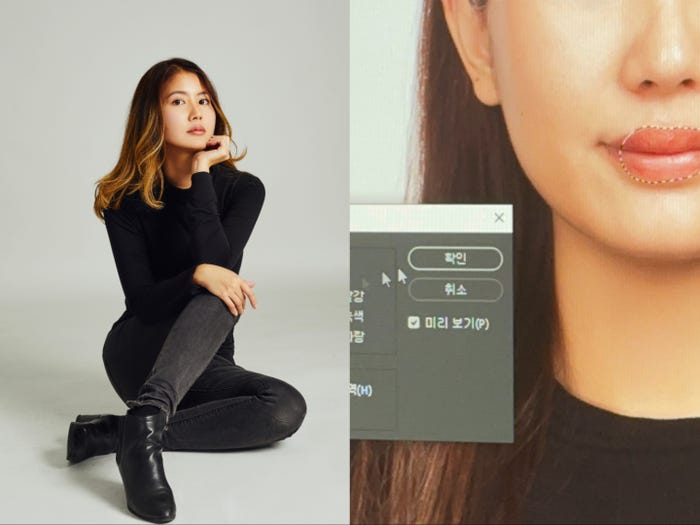A US expat in South Korea says plastic surgery is advertised on trains, passport pictures are edited, and shares 5 other surprising differences
5 min readA US expat in South Korea says plastic surgery is advertised on trains, passport pictures are edited, and shares 5 other surprising differences

- Chen Teng moved from New York to South Korea eight years ago.
- Teng said healthcare costs in Korea are extremely low compared to the US.
- She told Business Insider that vegans may find it difficult to find restaurant options.
She told Business Insider that after graduating college and experiencing burnout from her corporate job, she wanted a change.
“I wanted to move somewhere I didn’t know anyone. I didn’t speak the language. I was like, Korea — sounds great,” she told BI. She initially planned to stay for two to three years.
It’s now been eight years since Teng moved, and she currently works in the entertainment industry, modeling and freelancing.
She has more than 32,000 followers who enjoy watching her navigate life in Korea, from photoshopped passport pictures to clubs turning down entry to foreigners.
“I’ve always preferred to be upfront and transparent in sharing the highs and lows of my personal experiences,” she told BI.
Here are seven things she found surprising about life in Korea.
Plastic surgery is advertised on public transportation
Teng said plastic surgery culture is mainstream in Korea.
She told BI that having procedures like laser facials and botox is approached with the same blasé attitude as getting a manicure.
“There’s posters plastered on the trains, literally everywhere,” she added.
Teng told BI that these advertisements are targeted at Koreans rather than tourists and expats, so she hasn’t felt pressure to go under the knife.
Healthcare is extremely affordable compared to the US
Teng said when she first arrived in Korea she had to visit the doctor while uninsured.
“My coworkers were like, ‘It’s going to be so expensive,'” she told BI.
After having a check-up for her fever and sore throat, Teng was surprised to be handed a bill for the equivalent of $8.
She told BI her coworkers said that if she had been insured, the bill would have been roughly $3.
Some night clubs don’t allow foreigners to enter, according to Teng
Teng said that Korea is a homogenous country, so while acceptance of foreigners is getting better, it’s still a new adjustment.
She told BI there are foreigner-friendly areas in Seoul, which are parts of the city where a lot of foreigners live and work.
She said a club in the area had a sign saying that unless entrants had a card which is given to Koreans and Korean nationals abroad, they wouldn’t be permitted entry. “Which essentially means no foreigners are allowed in,” Teng added.
“There’s no discrimination law in Korea, so technically, that is allowed,” Teng told BI.
She said the city has foreigner-friendly clubs, but others aren’t always forthright about denying entry.
Rent can be as low as $120 a month
“There’s an interesting system in Korea with housing and there’s something called jeonse, and wolse,” Teng told BI.
Teng said jeonse is when someone gets a large loan from the bank, but they pay the interest back rather than the loan, and this makes rental payments very small. She added that from her experience, this is an option usually only given to Koreans.
“I just pay the deposit and my monthly rent,” Teng said, adding that this is called wolse.
“I would say the average rent here per month is maybe like 700,000-800,000 won,” Teng told BI. This is around $540-$610.
Teng said goshiwons are small closet rooms that are popular among young people who move to Korea to study. “You can get those for 200,000-300,000 a month,” she added, which is around $150-$230.
She said the basement apartments depicted in the Korean film “Parasite” do still exist, but many are refurbished and are a far cry from those on the silver screen.
Teng told BI a friend of hers pays about $700 for a basement apartment.
Food variety is limited, and vegans may find it difficult to source different options, Teng said
“Fruit here is quite expensive,” Teng said. She added that on a recent trip to a grocery store it was roughly $20 for a few apples.
“I miss my variety of apples, there’s not a variety of produce,” Teng added.
She said the reason for these high prices and a lack of variety is that produce is rarely imported into Korea.
She added that those with dietary restrictions like gluten free or vegan diets may find it difficult, as these diets aren’t widely followed outside large cities like Seoul and Busan.
“We didn’t get oat milk until post-Covid. Alternative milk options in coffee shops, that’s now becoming a thing,” she said.
Passport pictures are often automatically edited by staff, Teng said
“In Korea, they Photoshop everything, so your passport photo gets Photoshopped,” Teng told BI.
She said after your picture gets taken at a photography studio, they automatically begin the editing and you can watch them do it.
Teng told BI: “You can be like, can you slim my chin down? Or can you get the hairline a little bit more?”
She said if you don’t want your picture edited, then you need to specify this.
It’s safe to leave your belongings unattended
“The other day I was working in this cafe. I had to go up to the third floor to the bathroom and I left my laptop, my cell phone, my bag, and my wallet. I came back and everything was there,” Teng told BI.
She said when she returns to New York for vacations, she has to mentally prepare to watch her belongings.
Teng added that in most cases if you lose your belongings in Korea, it’s likely where you left it or someone has handed it to the local police station.
“We always say if you lose your stuff, it’s actually not a huge deal,” she told BI.
Teng told BI the positives of living in Korea explain why she has stayed in the country for as long as she has.
.content-lock-lock .hidden {
display: none;
}



